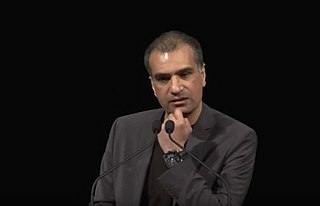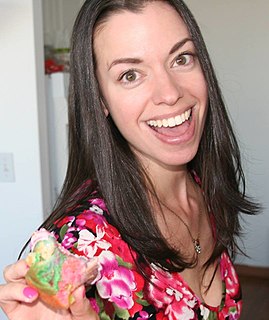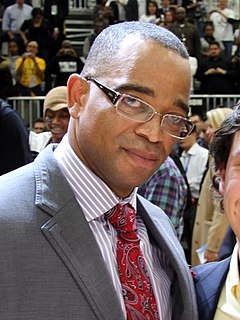A Quote by Nadeem Aslam
Nothing is an accident: it's always someone's fault; perhaps-but no one teaches us how to live with our mistakes. Everyone is isolated, alone with his or her anguish and guilt, and too penetrating a question can mean people are not able to face one another the next day.
Related Quotes
But in the end, science does not provide the answers most of us require. Its story of our origins and of our end is, to say the least, unsatisfactory. To the question, "How did it all begin?", science answers, "Probably by an accident." To the question, "How will it all end?", science answers, "Probably by an accident." And to many people, the accidental life is not worth living. Moreover, the science-god has no answer to the question, "Why are we here?" and, to the question, "What moral instructions do you give us?", the science-god maintains silence.
What does it mean when a man falls in love with a radiant face across the room? It may mean that he has some soul work to do. His soul is the issue. Instead of pursuing the woman and trying to get her alone, away from her husband, he needs to go alone himself, perhaps to a mountain cabin, for three months, write poetry, canoe down a river, and dream. That would save some women a lot of trouble.
After perhaps thirty meters, just as a soldier turned around, the girl was felled. Hands were clamped upon her from behind and the boy next door brought her down. He forced her knees to the road and suffered the penalty. He collected her punches as if they were presents. Her bony hands and elbows were accepted with nothing but a few short moans. He accumulated the loud, clumsy specks of saliva and tears as if they were lovely to his face, and more important, he was able to hold her down.
We can each sit and wait to die, from the very day of our births. Those of us who do not do so, choose to ask - and to answer - the two questions that define every conscious creature: What do I want? and What will I do to get it? Which are, finally, only one question: What is my will? Caine teaches us that the answer is always found within our own experience; our lives provide the structure of the question, and a properly phrased question contains its own answer.
We may spark something or set something in motion in another person's life by something we've done. Perhaps in a car accident we injure someone. Perhaps as a manager, we fire someone. There are a lot of things that could precipitate something negative in another person's life. But does that make us responsible for everything that follows from it? Is there a statute of limitations?
It is our destiny to live with the wrong as well as the right kind of citizens, and to learn from them, the wrong-minded ones, as much or more as from others. If we have not yet succeeded -after how many centuries?- in eliminating from life the elements which plague us perhaps we need to question life more closely. Perhaps our refusal to face reality is the only ill we suffer from, and all the rest but illusion and delusion. (p.26)
Every day, I am reminded that our life's journey is really about the people who touch us. When you die, it does not mean you lose to cancer. You beat cancer by how you live, why you live, and in the manner in which you live. So live. Live! Fight like hell. And when you get too tired to fight, then lay down and rest and let somebody else fight for you.
Bella: How could I live with myself when it’s my fault? None of you should be risking yourselves for me – Jasper: Bella, Bella, stop. You’re worrying all the wrong things, Bella. Trust me on this – none of us are in jeopardy… Our family is strong. Our only fear is losing you. Bella: But why should you – Alice: It’s been almost a century that Edward’s been alone. Now he’s found you. You can’t see the changes that we see, we who have been with him for so long. Do you think any of us want to look into his eyes for the next hundred years if he loses you?
Will’s voice dropped. “Everyone makes mistakes, Jem.” “Yes,” said Jem. “You just make more of them than most people.” “I —” “You hurt everyone,” said Jem. “Everyone whose life you touch.” “Not you,” Will whispered. “I hurt everyone but you. I never meant to hurt you.” Jem put his hands up, pressing his palms against his eyes. “Will —” “You can’t never forgive me,” Will said in disbelief, hearing the panic tinging his own voice. “I’d be —” “Alone?” Jem lowered his hand, but he was smiling now, crookedly. “And whose fault is that?
Learn something from marriage. Marriage represents the whole world in a miniature form: it teaches you many things. It is only the mediocre ones who learn nothing. Otherwise it will teach you that you don't know what love is, that you don't know how to relate, that you don't know how to communicate, that you don't know how to commune, that you don't know how to live with another. It is a mirror: it shows your face to you in all its different aspects. And it is all needed for your maturity. But a person who remains clinging to it forever remains immature. One has to go beyond it too.
I always give the analogy of the Earth at Night picture, of 7.3 billion of us, right? And everyone says, "Well, that's population." Well, if you took the entire world's population and you lived at the density of Manhattan proper - not a bad place to live - how much space do 7.3 billion people take up? The state of Colorado. At which point I end my lectures, because I want you to be thinking ... is this really a question of population, or is this a question of land use and resource consumption? And let's face it, the top 1.3 billion of us are doing all the damage. Sorry.






































